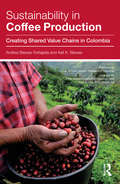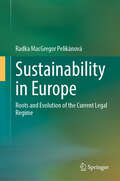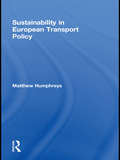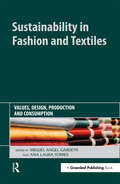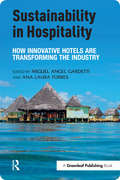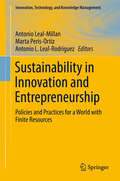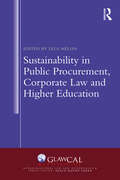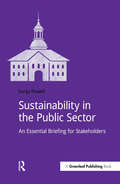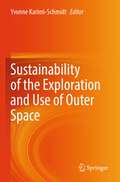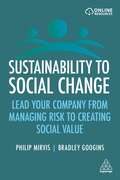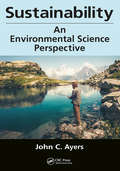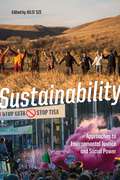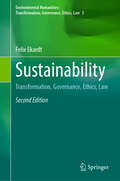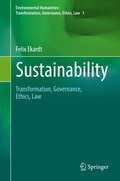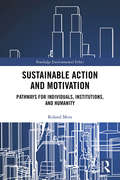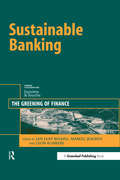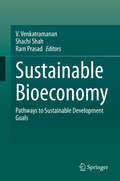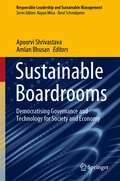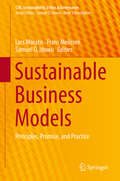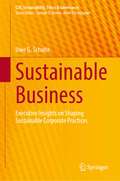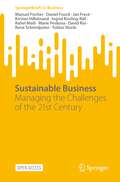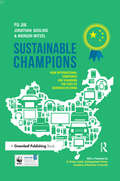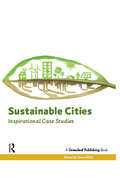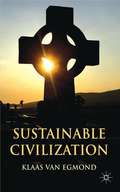- Table View
- List View
Sustainability in Coffee Production: Creating Shared Value Chains in Colombia
by Asit K. Biswas Andrea Biswas-TortajadaCoffee, as a commodity and through its global value chains, is the focus of much interest to achieve fair trade and equitable outcomes for producers, processors and consumers. It has iconic cultural and economic significance for Colombia, which is one of the world's major coffee producers for the global market. This book examines sustainable coffee production in Colombia, specifically the initiatives of Nestlé to create shared value. It describes the transformation of the coffee landscape by the development of economically, socially and environmentally viable and dedicated supply chains. Suppliers have been encouraged to shift production and quality paradigms, in order to develop long-term and sustainable strategies for higher value and premium quality products. This has been partially achieved by establishing a robust partnership with the Coffee Growers Federation and other public, private and social actors, thereby taking control of the institutional architecture and knowledge base that exists in the country. The book provides an important lesson of corporate social responsibility and the creation of shared value for the benefit of farmers, corporations and consumers.
Sustainability in Europe: Roots and Evolution of the Current Legal Regime
by Radka MacGregor PelikánováThis book analyses the roots and evolution of the concept of sustainability in Europe and the European Union. As sustainability has always mirrored certain value judgments on justice and priorities, it is suitable for functionalist, analytical, contextual and historical comparisons via multidisciplinary studies combining various branches of the social sciences, law, philosophy, and economics. The aim of this book is to explore the roots and evolution of sustainability, so as to reveal how a European style of sustainability has emerged, one that is inextricably linked to our civilization and history. It identifies linear and cyclical phases with clear trends toward expanding the reach of sustainability, its subjects and their duties. The book offers a multidisciplinary, chronological and contextual overview of the evolution of sustainability until the 21st century, while also addressing its legal regime. Sustainability has many faces and needs to be approached in a dynamic manner through the lens of sustainable development or via a multi-stakeholder model that includes private subjects and corporate social responsibility. Although primarily intended for an audience with an advanced background in law, economics and philosophy, the book will also benefit a more general audience, particularly those who want to learn where the current sustainability concerns and legal regime actually came from.
Sustainability in European Transport Policy
by Matthew HumphreysThe construction of the European Economic Communities in 1950 primarily set out to build an integrated economic zone in which national borders were, to a large extent, overcome. The ability of persons and goods to move freely within the economic zone was seminal in the realisation of economic integration. Underlying this, and therefore an implied necessity for European growth, an effective transport infrastructure was essential. However, with rising awareness of environmental issues, and a closer regard to sustainability of development, European transport systems and their regulation have come under scrutiny. This book sets out a critical analysis of the body of law and policy initiatives that constitute the EU's common transport policy. The development of the transport policy is charted through amending and founding Treaties as well as non-legislative documents. The book uses a model of sustainability as the basis for the analysis as the criteria for sustainable development were set out under Article Eleven of the Treaty on the Functioning of the European Union. However, sustainable development, when taken in the context of transport is difficult to reconcile with unbridled economic growth and unchecked freedom of movement and the book identifies a contradiction at the heart of European policy which can only become more accentuated as environmental trends become more explicit. The book argues that European regulation will eventually be forced to recognize this dichotomy, and take more forceful action to protect environmental and social development, even at the cost of economic progress. This book will be of great interest to researchers and students on European Union law and policy courses, transport studies courses and European integration courses. The book is of relevance to all those interested in environmental and transport matters.
Sustainability in Fashion and Textiles: Values, Design, Production and Consumption
by Miguel Angel Gardetti Ana Laura TorresThere is no doubt that the textile industry – the production of clothing, fabrics, thread, fibre and related products – plays a significant part in the global economy. It also frequently operates with disregard to its environmental and social impacts. The textile industry uses large quantities of water and outputs large quantities of waste. As for social aspects, many unskilled jobs have disappeared in regions that rely heavily on these industries. Another serious and still unresolved problem is the flexibility textile industry companies claim to need. Faced with fierce international competition, they are increasingly unable to offer job security. This is without even considering the informal-sector work proliferating both in developing and developed countries. Child labour persists within this sector despite growing pressure to halt it.Fashion demands continuous consumption. In seeking to own the latest trends consumers quickly come to regard their existing garments as inferior, if not useless. "Old" items become unwanted as quickly as new ones come into demand. This tendency towards disposability results in the increased use of resources and thus the accelerated accumulation of waste. It is obvious to many that current fashion industry practices are in direct competition with sustainability objectives; yet this is frequently overlooked as a pressing concern.It is, however, becoming apparent that there are social and ecological consequences to the current operation of the fashion industry: sustainability in the sector has been gaining attention in recent years from those who believe that it should be held accountable for the pressure it places on the individual, as well as its contribution to increases in consumption and waste disposal.This book takes a wide-screen approach to the topic, covering, among other issues: sustainability and business management in textile and fashion companies; value chain management; use of materials; sustainable production processes; fashion, needs and consumption; disposal; and innovation and design.The book will be essential reading for researchers and practitioners in the global fashion business.
Sustainability in Hospitality: How Innovative Hotels are Transforming the Industry
by Miguel Angel Gardetti Ana Laura TorresThis ground-breaking research represents the most complete collection yet on how the hospitality industry is addressing sustainability and ethical issues. Covering supply chain management, innovative sustainability initiatives, CSR programmes, biologically-respectful tourism and Value Creation, Sustainability in Hospitality: How Innovative Hotels are Transforming the Industry presents valuable global viewpoints on embedding sustainability into all aspects of the hospitality industry, and the impact this could have on transforming the sector into an advocate for more sustainable, eco-conscious tourism.The chapters in this edited collection span organizational governance, human rights and labour practices, environment and climate change, fair operating practices, stakeholder engagement, CSR and strategic management. The global reach of the collection brings case studies from China, the US, the UK, Mexico and Italy, while company case studies include Fairmont Luxury Hotels and Sextantio.Sustainability in Hospitality: How Innovative Hotels are Transforming the Industry will be an essential read for academics researching the development of ethically-conscious and sustainable hospitality, and for hotel managers and group CEOs who want to know how sustainability and CSR can be embedded in their day-to-day operations.
Sustainability in Innovation and Entrepreneurship
by Marta Peris-Ortiz Antonio Leal-Millan Antonio L. Leal-RodríguezThis book provides a richly illustrated study of sustainability, innovation and entrepreneurship. Specifically, it examines the ways in which governmental policies and practices modify the social conditions necessary to promote innovation in businesses and by so doing impact economic development. Exploring topics such as green innovation, green customer capital, smart cities, green entrepreneurship and environmental responsibility, this book presents some of the most current research and best practices in the field. In today's global economy, strategies, policies and practices that address the negative effects of human activity on the environment need to be incorporated into the business framework in order for companies to achieve a sustainable competitive advantage. Around the world, such changes have already resulted in a broad range of products, production methods and technical features that ensure environmental protection. At the same time, the mass media's communication of a deteriorating earth have motivated a growing number of citizens in both developed and developing nations to modify their consumption habits towards more ecological products. Consequently, an increasing number of companies are reacting to these changes in business and legal frameworks and consumer preferences by investing in new forms of green innovation or "eco-innovation" designed to promote both environmental and corporate sustainability. For example, Hewlett-Packard eliminated lead from its welding process; Wal-Mart reduced the emissions of their suppliers; and Cisco, Dell and IBM are investing in smart grids. This volume showcases pioneering efforts among companies, citizens, and government agencies that are moving from theory to practice by placing sustainability at the core of their development strategies.
Sustainability in Public Procurement, Corporate Law and Higher Education (Transnational Law and Governance)
by Lela MélonContemporary changes in law and policy at the global level to efficiently answer to environmental and social issues correspond to the traditional approach of limiting the regulatory and policy changes to a singular field or discipline: tackling the inherent unsustainability of corporate laws or incentivising the offering of sustainable finance to stimulate the transition towards sustainable practices. This book provides a new viewpoint and approach of simultaneously regulating seemingly non-connected fields in order to provide a fertile ground for a truly organic change towards sustainable outcomes. It addresses diverse questions of sustainable transition of the three specific fields to support sustainable practices in public procurement, private market transaction, and in educating future business leaders and legal experts by incorporating sustainable concerns as the underlying guiding principles of their conduct. It translates scientific findings into a practical format that can be used by diverse stakeholders searching for information and solutions in their respective professional fields. The underlying assumption is that a simultaneous action in the three respective fields of public procurement, corporate law, and higher education brings about more coherent and interconnected results that incentivise further action and changes towards sustainable practices. The book furthers the idea of policy coherence by building upon the findings in the field of public procurement, corporate law, and practice and higher education curricula. By identifying the barriers in the three respective fields for sustainable action and proposing solutions for either eliminating or minimising those barriers at the EU level, the book calls for further changes in the respective fields as well as for considering the spillover effects of these policies on other fields.
Sustainability in the Public Sector: An Essential Briefing for Stakeholders (Doshorts Ser.)
by Sonja PowellSustainability in the Public Sector provides a quick-start guide for a wide variety of public sector stakeholders, equipping them with knowledge of both the sustainable development challenges and the political backdrop to this agenda.This guide: uncovers the history of the term "sustainable development" and introduces basic sustainability theory; highlights the realities of the politics behind the sustainable development agenda, alongside the responses of successive political administrations; provides a snapshot of how sustainable development in local government is developed and demystifies the roadmap for achieving the UK’s 2050 carbon reduction targets.This book will be invaluable to a variety of public bodies, such as local authorities, and their stakeholders, including councillors, officers, members of Local Enterprise Partnerships, Local Nature Partnerships, scrutiny panels and other forums, in enhancing understanding of both the sustainable development challenge facing us today and the political backdrop to this agenda.
Sustainability of the Exploration and Use of Outer Space
by Yvonne Karimi-SchmidtThis book provides insight into the significance of the law of outer space in promoting order, cooperation, and peaceful activities in space. It emphasizes the advantages of having a legal framework in place to govern space exploration and utilization, rather than relying on power and force.
Sustainability to Social Change: Lead Your Company from Managing Risks to Creating Social Value
by Philip Mirvis Bradley GooginsIs your company using its talent to create social value? Or is it simply managing risks? To address the problems facing society and business today, sustainability is not good enough.Instead, companies need to do their part to lead social change. In Sustainability to Social Change, leadership and social innovation experts Philip Mirvis and Bradley K. Googins share their hands-on research to reveal how leaders can design and guide their companies to create more inclusive prosperity and become agents of social change. The book reveals the inside story of how socially innovative companies are making the strategic shift from minimizing risk to creating social value. It then outlines the strategies and practices that leaders can use to address the five biggest problems facing companies and society today: Purpose, Prosperity, Products, Planet and People. Filled with real life examples, hands-on guidelines and self-assessments to rate your company's performance, Sustainability to Social Change helps you pivot your company's mindset and practices in order to enhance society and the environment, and fuel its own success. Online resources include a guide to help employees become socially conscious, operate in a purposeful company, become allies for equity and social justice, add social value at work and establish "green" habits.
Sustainability: An Environmental Science Perspective
by John C. AyersThis book presents an earth science-based overview of the challenges to sustainability. It provides a detailed study of climate change, as well as energy, food, and water security across different regions. The author uncovers the problems caused by current social and environmental practices, and offers potential solutions. Focusing on systems theory, footprint analysis, risk, and resilience, many examples are given of how to use resources sustainably, especially common pool resources such as the atmosphere, oceans, and groundwater. The book develops its ideas from an array of practical case studies, centering on communal objectives and shared responsibilities.
Sustainability: Approaches to Environmental Justice and Social Power
by Julie SzeA critical resource for approaching sustainability across the disciplines Sustainability and social justice remain elusive even though each is unattainable without the other. Across the industrialized West and the Global South, unsustainable practices and social inequities exacerbate one another. How do social justice and sustainability connect? What does sustainability mean and, most importantly, how can we achieve it with justice? This volume tackles these questions, placing social justice and interdisciplinary approaches at the center of efforts for a more sustainable world. Contributors present empirical case studies that illustrate how sustainability can take place without contributing to social inequality. From indigenous land rights, climate conflict, militarization and urban drought resilience, the book offers examples of ways in which sustainability and social justice strengthen one another. Through an understanding of history, diverse cultural traditions, and complexity in relation to race, class, and gender, this volume demonstrates ways in which sustainability can help to shape better and more robust solutions to the world’s most pressing problems. Blending methods from the humanities, environmental sciences and the humanistic social sciences, this book offers an essential guide for the next generation of global citizens.
Sustainability: Transformation, Governance, Ethics, Law (Environmental Humanities: Transformation, Governance, Ethics, Law #5)
by Felix EkardtThis book proposes a holistic transdisciplinary approach to sustainability and post-fossil societies as a subject of social sciences - at a time when post-fossilisation is becoming a core political concern due to the aggressive foreign policy of autocracies, also for reasons beyond sustainability. Furthermore, the book shows new ways, as perspectives of philosophy, political science, law, economics, sociology, cultural studies and others are here no longer regarded separately. Instead, integrated perspectives on the key issues are carved out: Perspectives on conditions of transformation to sustainability, on key instruments and the normative questions. This allows for a concise answer to urgent and controversial questions such as the following: Is the EU an environmental pioneer? Is it possible to achieve sustainability by purely technical means? If not: will that mean to end of the growth society? How to deal with the follow-up problems? How will societal change be successful? Are political power and capitalism the main barriers to sustainability? What is the role of emotions and conceptions of normality in the transformation process? To which degree are rebound and shifting effects the reason why sustainability politics fail? How much climate protection can be claimed ethically and legally e.g. on grounds of human rights? And what is freedom? Despite all rhetoric, the weak transition in energy, climate, agriculture and conservation serves as key example in this book. It is shown how the Paris Agreement is weak with regard to details and at the same time overrules the growth society by means of a radical 1,5 degrees temperature limit. It is shown how emissions trading must – and can – be reformed radically. It is shown why CSR, education, cooperation and happiness research are overrated. And we will see what an integrated politics on climate, biodiversity, nitrogen and soil might look like. This book deals with conditions of transformation, governance instruments, ethics and law of sustainability. The relevance of the humanities to sustainability has never before been demonstrated so vividly and broadly as here. And in every area it opens up some completely new perspectives.
Sustainability: Transformation, Governance, Ethics, Law (Environmental Humanities: Transformation, Governance, Ethics, Law)
by Felix EkardtThis book proposes a holistic transdisciplinary approach to sustainability as a subject of social sciences. At the same time, this approach shows new ways, as perspectives of philosophy, political science, law, economics, sociology, cultural studies and others are here no longer regarded separately. Instead, integrated perspectives on the key issues are carved out: Perspectives on conditions of transformation to sustainability, on key instruments and the normative questions. This allows for a concise answer to urgent and controversial questions such as the following: Is the EU an environmental pioneer? Is it possible to achieve sustainability by purely technical means? If not: will that mean to end of the growth society? How to deal with the follow-up problems? How will societal change be successful? Are political power and capitalism the main barriers to sustainability? What is the role of emotions and conceptions of normality in the transformation process? To which degree are rebound and shifting effects the reason why sustainability politics fail? How much climate protection can be claimed ethically and legally e.g. on grounds of human rights? And what is freedom? Despite all rhetoric, the weak transition in energy, climate, agriculture and conservation serves as key example in this book. It is shown how the Paris Agreement is weak with regard to details and at the same time overrules the growth society by means of a radical 1,5-1,8 degrees temperature limit. It is shown how emissions trading must – and can – be reformed radically. It is shown why CSR, education, cooperation and happiness research are overrated. And we will see what an integrated politics on climate, biodiversity, nitrogen and soil might look like.
Sustainable Action and Motivation: Pathways for Individuals, Institutions and Humanity (Routledge Environmental Ethics)
by Roland MeesSustainable Action and Motivation proposes individual competencies and institutional policies that can help overcome the motivational hurdles that hamper sustainable action. Following the Paris Agreement of 2015 and the UN Sustainable Development Goals, the political momentum urgently to begin the drastic reduction of greenhouse gas emissions has increased significantly. Affluent, high-income OECD countries are expected to take the lead in the global transition to a low carbon society. Given this, we need a better understanding of the motivational problems that people in affluent countries face with acting sustainably. This book investigates the above questions by analysing three fundamentally different perspectives: individuals and their motivation to act sustainably; institutions who take responsibility for issuing policies that steer us towards taking sustainable action; and humanity, each individual member of which ought to understand his or her non-sustainable behaviour in relation to the continued existence of the collective of human beings. Using theories from empirical psychology and a phenomenological approach to the research, this book will be of great interest to students and scholars of practical philosophy, psychology of motivation and environmental psychology, as well as policymakers looking for ways to implement effective policies that encourage pro-environmental behaviour.
Sustainable Aviation: A Management Perspective (Management for Professionals)
by Andreas Wittmer Judith L. WallsThis book analyses from a management perspective how the aviation industry can achieve a sustainability transformation in order to reach the Paris climate targets for 2050 and provides various strategic and operational recommendations in this regard. It examines various elements of the aviation system exhaustively, including technologies, consumers, airlines, airports and policies, from both short- and long-term standpoints. Specific questions and contradictions, as well as concrete options for taking action, are presented. It also includes numerous practical case studies, which will help practitioners transfer the concepts into their everyday work. The book is aimed at a broad, professional audience consisting of managers, politicians and regulators, but also at advanced students engaged in academic and professional education.
Sustainable Banking: The Greening of Finance
by Marcel Jeucken Jan Jaap Bouma Leon KlinkersThis comprehensive addition to the debate on sustainable development has been produced in order to take a global pulse on how the financial services sector is responding to the growing challenge of shareholder and stakeholder expectations on social and environmental performance. In the opinion of many commentators in this new book, given the intermediary role banks play within economies, their potential contribution toward sustainable development is enormous. Indeed, for banks, the conclusion that corporate sustainability has become an investable concept that increases long-term shareholder value is becoming difficult to deny.To date, banks have been relatively slow to examine their exposure to risk (the environmental and social performance of their clients) and the business opportunities of sustainable development (the products and services they offer). Not before time, Sustainable Banking concludes that this is beginning to change, with both risk and opportunity becoming established elements in banking policies towards environmental sustainability. In addition, banks have now begun to take notice of and address their own environmental performance. Through the use of case studies and detailed analysis, the book examines the environmental policies of banks, the importance of transparency and communication with their stakeholders, environmental and ethical investment funds, current practice by the providers of financial services with regard to environmental risk management and, finally, the key role of government, NGOs and multilateral banks in delivering sustainability.Sustainable banking has not, however, been achieved and nor will it be in the immediate future. As globalisation proceeds apace, Sustainable Banking argues that improvements are necessary in banks' attitudes toward transparency and accountability with regard to their lending policies. In addition, in order to promote best practice, the leading banks need to start measuring their customers' environmental performance in order to persuade polluting clients that minimum compliance to regulations will no longer suffice. The book finds many shining examples in the co-operative, mutual and social sectors for the big players to emulate. Environmental and ethical considerations in such loan portfolios have proven to be profitable and "best-in-class" larger banks are now also reaping benefits.The unprecedented scope of the book has attracted contributors from four continents including Deloitte & Touche, Rabobank, The World Bank, The European Bank for Reconstruction and Development, The United Nations Environment Programme, The World Business Council for Sustainable Development, UBS, Henderson Investors, KPMG, The World Resources Institute and SAM Sustainability.
Sustainable Bioeconomy: Pathways to Sustainable Development Goals
by Ram Prasad Shachi Shah V. VenkatramananSustainable development is the most important challenge facing humanity in the 21st century. The global economic growth in the recent past has indeed exhibited marked progress in many countries. Nevertheless, the issues of income disparity, poverty, gender gaps, and malnutrition are not uncommon in the global landscape, in spite of the upward growth of the economy and technological advances. This grim picture is further exacerbated by our growing human population, unmindful resource use, ever-increasing consumption trends, and changing climate. In order to protect humanity and preserve the planet, the United Nations issued the “2030 agenda for sustainable development,” which includes but is not limited to sustainable production and consumption practices, e.g. in a sustainable bioeconomy. The hallmark of the sustainable bioeconomy is a paradigm shift from a fossil-fuel-based economy to a biological-based one, which is driven by the virtues of sustainability, efficient utilization of resources, and “circular economy.” As the sustainable bioeconomy is based on the efficient utilization of biological resources and societal transformations, it holds the immense potential to achieve the UN’s Sustainable Development Goals. This book shares valuable insights into the linkages between the sustainable bioeconomy and Sustainable Development Goals, making it an essential read for policymakers, researchers and students of environmental studies.
Sustainable Boardrooms: Democratising Governance and Technology for Society and Economy (Responsible Leadership and Sustainable Management)
by Apoorvi Shrivastava Amlan BhusanThis book discusses various interactions in the sustainability and development sector. It presents a thematic approach to describe progressive models and cases on disruptions, innovations, regulatory and institutional evolution related to the area of sustainability, through an organizational and boardroom level governance lens. It documents how certain schools of thought, models of engagement and methods-platforms-practices impact society and while doing so, brings together varying theoretical debates, practicing models and instruments of transformation in green governance. Sustainable policy making demands a whole of government approach in decision-making processes. Further, inclusiveness and ‘green’ consciousness of corporate boardrooms are paramount, without which, effective socially responsible business practices are absurd. Human resource development, shaped on sustainable corporate ethics, requires well-trained sustainability specialists, managers that can think ‘green’ in their overall decision making which are essential for green governance. In this context, the book creates a functional, interpretive repertoire of stories, commentaries, life experiences, and reflections of corporate leaders, academics, and practicing consultants, on their decision-making processes, and how they interpret sustainability. These stories and thoughts help create a functional academic construct, which will assist academics teach ‘green’ competencies to business school students better, and entrepreneurs and business executives to better understand the idea of sustainable growth.
Sustainable Business Models: Principles, Promise, and Practice (CSR, Sustainability, Ethics & Governance)
by Samuel O. Idowu Frans Melissen Lars MoratisThis book provides a rich overview and takes a closer look at the current state of theory and practice in the field of sustainable business models. The chapters in this book examine and analyze existing and new approaches towards sustainable business models and showcase the implementation of sustainable business through both quantitative and qualitative studies, including several case studies and many practical examples. It approaches these issues from the standpoints of diverse business disciplines to yield new insights and ideas that are relevant from both an academic and professional perspective. In its essence, the book examines how firms’ value creation processes can be driven by sustainability and social responsibility and how this impacts business and society. Readers will find a range of sustainable business models that have been employed and are being pioneered in various industries around the globe – which are thoroughly investigated and discussed, and put into a comprehensive conceptual framework.
Sustainable Business: Executive Insights on Shaping Sustainable Corporate Practices (CSR, Sustainability, Ethics & Governance)
by Uwe G. SchulteThis book presents discussions with corporate practitioners on several topics around sustainability. Between May 2019 and November 2022, the author engaged in dialogues with Senior Executives representing major multinational corporations, overseeing their corporate sustainability endeavours. The thematic spectrum of these conversations encompassed diverse topics such as The United Nations Sustainable Development Goals, Water-stressed regions, Ocean Plastic, Chemical Recycling, Renewable Energy, Sustainable Tourism, and the Just Transition, among others, with each episode concentrating on a singular subject. In this book supporting illustrations and graphs together with background references enrich the insights the conversations convey. The reader will learn about the sustainability challenges companies are facing and how they approach them. The book gives examples of sustainable solutions and international collaborations around greenhouse gas reduction, circular economy, restorative tourism as well as reducing plastic pollution and other global sustainability challenges.
Sustainable Business: Managing the Challenges of the 21st Century (SpringerBriefs in Business)
by René Schmidpeter Manuel Fischer David Risi Ingrid Kissling-Näf Daniel Foord Jan Frecè Kirsten Hillebrand Rahel Meili Marie Peskova Tobias StuckiThis open access book is a compact guide to the development of sustainable business, which has become the central concept in discussions about the future development of humanity and planet earth. It provides basic terminology and concepts on sustainable business and offers insights into a new management paradigm that integrates social and environmental dimensions into business models, strategies, and operations. New business concepts such as the donut economy, the circular economy, social innovation and sustainable leadership are introduced and the book outlines how they influence the way we run businesses today and in the future. This book lays the foundation for new management thinking in business and academia, making it a essential reader for professionals and students alike.
Sustainable Champions: How International Companies are Changing the Face of Business in China
by Jonathan Gosling Morgen Witzel Fu JiaIn the face of strong competitive pressure and a dynamic market, multinational companies in China are forced to innovate with extraordinary pace and inventiveness. Environmental sustainability is a vital benchmark, and is a key driver for the best companies in each sector – many of them allied with the WWF Climate Savers programme.Sustainable Champions shows how nine leading multinational companies – including Nestlé, HP, Tetra Pak and Sony – are dealing with environmental, supply chain and ethical challenges in China. The book illuminates some of their transformative practices, and the impact this is having on business in China and beyond. The concluding cross-case analysis of supply chain and environmental challenges faced by leading international firms presents key lessons for business and for sustainability champions.Sustainable Champions: How International Companies are Changing the Face of Business in China is essential reading for researchers and course leaders seeking on-the-ground examples of local environmental challenges, and any company doing business in one of the world’s fastest-growing economies.With a Foreword by Simon Zadek, Distinguished Fellow, Academy of Business in Society, Visiting Scholar, Tsinghua School of Economics and Management.
Sustainable Cities: Inspirational Case Studies
by Simon MillsWinners and nominees of the 2013/14 Sustainable City Awards present their case stories in a new collection, Sustainable Cities: Inspirational Case Studies. These short, easy-to-read stories will serve as an inspiration to others around the world in the quest to make our cities more sustainable.The awards were established in 2001 by the City of London Corporation and aim to recognise and reward organisations that have demonstrated excellence in sustainable development. Sustainable Cities is published by Greenleaf Publishing in association with the City of London.
Sustainable Civilization
by Klaas Van EgmondWestern civilization has entered a new fundamental crisis that can be explained by a very one-sided orientation of social values based on materialism and egocentrism, which is disrupting the delicate balance between the opposing forces of 'mind' and 'matter', and of 'I' and 'the others'. Many sources from the great works of philosophy, religion, art and culture to social surveys and the course of history qualify sustainability as the dynamic equilibrium between fundamental opposing forces. This insight and the ethical ability to better discriminate between stabilizing and destabilizing forces would allow further justification of human rights and new institutional arrangements in society at large and, in particular, in politics, economy and finance. It would enable a sustainable civilization to flourish within the boundaries of freedom and human dignity. "
